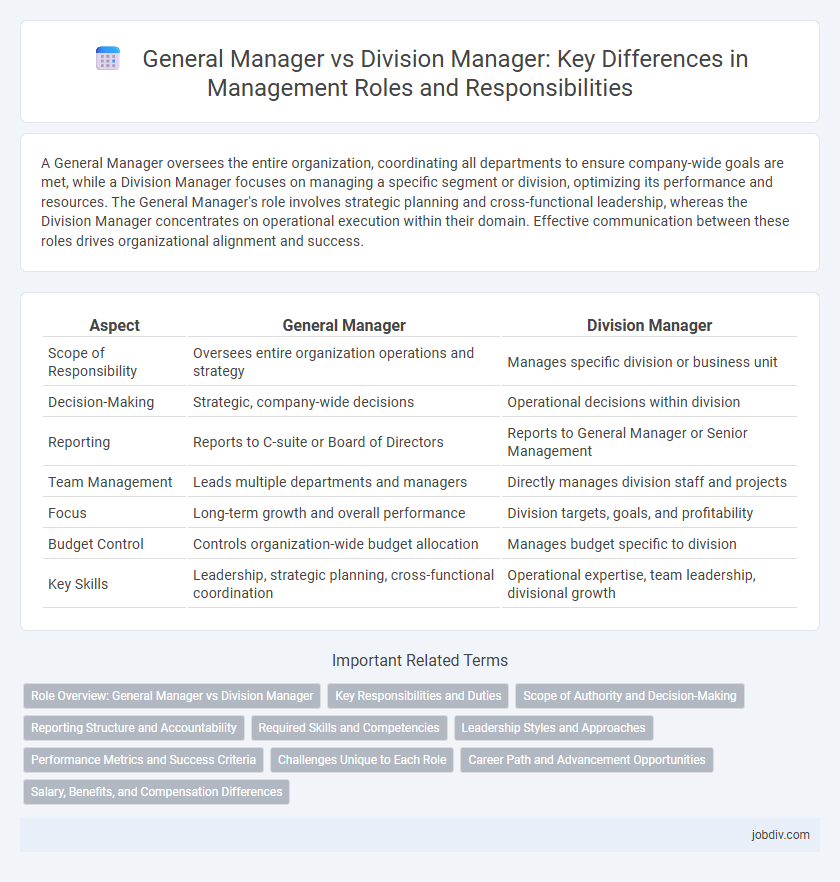A General Manager oversees the entire organization, coordinating all departments to ensure company-wide goals are met, while a Division Manager focuses on managing a specific segment or division, optimizing its performance and resources. The General Manager's role involves strategic planning and cross-functional leadership, whereas the Division Manager concentrates on operational execution within their domain. Effective communication between these roles drives organizational alignment and success.
Table of Comparison
| Aspect | General Manager | Division Manager |
|---|---|---|
| Scope of Responsibility | Oversees entire organization operations and strategy | Manages specific division or business unit |
| Decision-Making | Strategic, company-wide decisions | Operational decisions within division |
| Reporting | Reports to C-suite or Board of Directors | Reports to General Manager or Senior Management |
| Team Management | Leads multiple departments and managers | Directly manages division staff and projects |
| Focus | Long-term growth and overall performance | Division targets, goals, and profitability |
| Budget Control | Controls organization-wide budget allocation | Manages budget specific to division |
| Key Skills | Leadership, strategic planning, cross-functional coordination | Operational expertise, team leadership, divisional growth |
Role Overview: General Manager vs Division Manager
The General Manager oversees overall operations and strategic direction across multiple departments, ensuring alignment with company goals and optimizing resource allocation at the corporate level. The Division Manager focuses on managing a specific business unit, driving performance, and implementing strategies tailored to that division's market and operational needs. While the General Manager has a broader scope with cross-functional responsibilities, the Division Manager's role is more specialized and execution-oriented within their designated division.
Key Responsibilities and Duties
The General Manager oversees overall operations, strategic planning, financial performance, and resource allocation across all divisions, ensuring alignment with corporate goals. The Division Manager focuses on managing a specific business unit or product line, driving divisional sales, operational efficiency, and team leadership within their domain. Both roles require leadership and decision-making skills, but the General Manager holds broader accountability while the Division Manager concentrates on specialized departmental execution.
Scope of Authority and Decision-Making
General Managers hold comprehensive authority over multiple divisions, overseeing company-wide strategy, resource allocation, and cross-functional coordination, which enables broad decision-making impacting overall organizational performance. Division Managers possess specialized authority focused on a specific business unit or product line, directing operational activities, budgeting, and team management within their division's scope. Decision-making for General Managers involves long-term strategic planning and high-level policies, whereas Division Managers focus on tactical execution and achieving divisional objectives.
Reporting Structure and Accountability
A General Manager oversees multiple divisions and reports directly to the executive leadership, ensuring accountability for overall business performance across departments. Division Managers report to the General Manager and are responsible for the performance, strategy implementation, and operational outcomes within their specific division. This hierarchical reporting structure clarifies accountability, with Division Managers focusing on divisional goals and the General Manager integrating these to align with corporate objectives.
Required Skills and Competencies
General Managers require strategic vision, leadership acumen, and proficiency in cross-functional coordination to drive overall business growth and operational efficiency. Division Managers must excel in specialized industry knowledge, team management, and operational execution within their specific business unit to meet divisional goals. Both roles demand strong communication skills, problem-solving abilities, and financial acumen, but General Managers prioritize broader organizational impact while Division Managers focus on tactical implementation.
Leadership Styles and Approaches
General Managers typically employ a transformational leadership style, focusing on vision, strategic alignment, and motivating cross-functional teams to achieve organizational goals. Division Managers often adopt a transactional leadership approach, emphasizing operational efficiency, performance metrics, and direct supervision within their specific business units. Understanding these distinct leadership approaches enhances organizational effectiveness by aligning management practices with company structure and objectives.
Performance Metrics and Success Criteria
General Managers are evaluated on overall company performance metrics such as profitability, market share growth, and operational efficiency, reflecting their broad strategic oversight. Division Managers focus on specific business unit KPIs like revenue targets, cost control, and team productivity, directly impacting their division's success criteria. Both roles require alignment with organizational goals, but General Managers prioritize enterprise-wide outcomes while Division Managers emphasize divisional performance optimization.
Challenges Unique to Each Role
General Managers face the challenge of overseeing multiple divisions and aligning diverse business units with the overall corporate strategy, requiring strong cross-functional leadership and strategic decision-making skills. Division Managers must navigate the complexities of managing a specific business unit, including meeting divisional targets, optimizing resources, and addressing operational issues unique to their market segment. Both roles require balancing short-term operational demands with long-term growth objectives, but General Managers focus more on organizational integration while Division Managers concentrate on tactical execution within their division.
Career Path and Advancement Opportunities
A General Manager typically oversees multiple divisions or an entire organization, offering broader strategic leadership and higher-level decision-making responsibilities, which aligns with advanced career growth and executive roles. In contrast, a Division Manager focuses on managing a specific business unit or department, providing specialized operational expertise and a clearer path toward senior management within their area. Career advancement from Division Manager to General Manager often requires demonstrated success in cross-functional leadership, strategic planning, and organizational impact.
Salary, Benefits, and Compensation Differences
General Managers typically earn higher salaries than Division Managers due to broader organizational responsibilities and overall company oversight, with median salaries ranging from $110,000 to $180,000 annually compared to $80,000 to $130,000 for Division Managers. Benefits for General Managers often include enhanced executive perks such as stock options, performance bonuses, and comprehensive retirement plans, while Division Managers usually receive standard benefits packages aligned with mid-level management roles. Compensation structures for General Managers emphasize incentive-based pay tied to company-wide performance, whereas Division Managers' bonuses are frequently linked to division-specific targets and operational outcomes.
General Manager vs Division Manager Infographic

 jobdiv.com
jobdiv.com